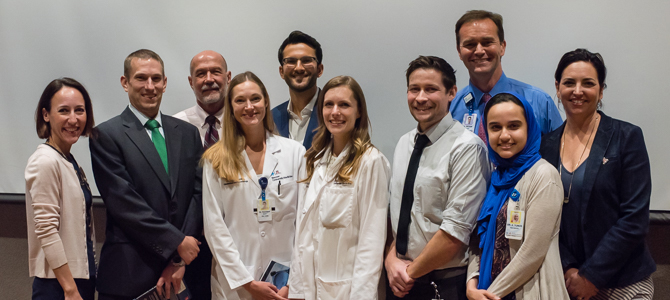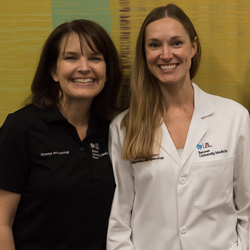
Residents and Fellows Present at Annual High Value Care Competition

Four High Value Care semi-finalists presented at the Fifth Annual House Staff Quality and Safety Day, discussing their inventive, cost-effective and research-backed projects that will improve health care.
More than 130 residents and fellows from the University of Arizona College of Medicine – Phoenix attended the event, which took place at Banner – University Medical Center Phoenix on May 15.
“We seek to find opportunities for residents and fellows to engage actively in quality improvement work,” Emily Mallin, MD, co-chair of the event said. “We help support and encourage them to continue this work because this is going to be their lifelong work, whether they know it or not.”

“This project was important to me because it was an issue that I saw first-hand,” Dr. Saunders said. “After seeing such a dramatic improvement, I am really excited that as a resident, I can have an impact to make positive change.”
The three semi-finalists were:
- Mandy Boltz, MD, Shawn Abreu, MD, and Asfiya Yunus, MD, family medicine, “Reducing Overuse of Telemetry Monitoring.”
- Michael Rowley, MD, internal medicine, “Decreasing Fresh Frozen Plasma Transfusions in Cirrhotic Patients with use of Thromboelastography."
- Kayvahn Steck-Bayat, MD, minimally invasive gynecologic surgery fellow, “A Randomized Trial Comparing Two Patient Positioning Systems in Robotic Gynecologic Surgery."
The competition was graded by a group of eight judges from Banner and the College of Medicine – Phoenix. Banner medical staff donated prizes of $2,500 each to three semi-finalists from the High Value Care Contest, who then had half a year to implement their project. A fourth “wild card” semi-finalist was chosen from the posters presentations. Dr. Saunders received an additional $2,500 for winning.
The High Value Care competition was started five years ago by Steven Brown, MD, and Cheryl O’Malley, MD. This year’s chairs were Dr. Brown, Dr. O’Malley, Richard Gerkin, MD, and Dr. Mallin.
“High value care is incredibly important to our health care system, and we felt like the residents and fellows were the ones seeing these opportunities to improve the quality and value of care,” Dr. Brown said. “Just seeing the work that these residents and fellows have done has been inspiring.”
Guy Reed, MD, MS, dean of the College of Medicine – Phoenix, provided closing remarks and was one of the judges for the event.
“Someone once said that ‘safety isn’t just expensive, it’s priceless,’” Dean Reed said. “These presentations really demonstrated the value of an academic medical center. This is really exciting work and I want to say, please publish it. Otherwise, this work will be the best kept secret in Phoenix.”
Funding was provided by the Banner – University Medical Center Phoenix medical staff, travel funds by the Department of Medical Education and for the interdisciplinary teams by Banner – University Medical Center Phoenix Administration.
About the College
Founded in 2007, the University of Arizona College of Medicine – Phoenix inspires and trains exemplary physicians, scientists and leaders to advance its core missions in education, research, clinical care and service to communities across Arizona. The college’s strength lies in our collaborations and partnerships with clinical affiliates, community organizations and industry sponsors. With our primary affiliate, Banner Health, we are recognized as the premier academic medical center in Phoenix. As an anchor institution of the Phoenix Bioscience Core, the college is home to signature research programs in neurosciences, cardiopulmonary diseases, immunology, informatics and metabolism. These focus areas uniquely position us to drive biomedical research and bolster economic development in the region.
As an urban institution with strong roots in rural and tribal health, the college has graduated more than 1,000 physicians and matriculates 130 students each year. Greater than 60% of matriculating students are from Arizona and many continue training at our GME sponsored residency programs, ultimately pursuing local academic and community-based opportunities. While our traditional four-year program continues to thrive, we will launch our recently approved accelerated three-year medical student curriculum with exclusive focus on primary care. This program is designed to further enhance workforce retention needs across Arizona.
The college has embarked on our strategic plan for 2025 to 2030. Learn more.